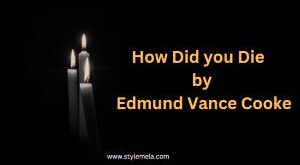Gothic Poems: Exploring the Dark and Mysterious World of Gothic Poetry
Introduction
Gothic poetry is a world filled with dark themes, mysterious settings, and haunting beauty. This style of poetry explores fear, death, and the supernatural, making it both chilling and captivating. In this post, we’ll dive into what Gothic poetry is, its themes, famous examples, and how you can write your own Gothic poem.
What is Gothic Poetry?
Gothic poetry is part of the larger Gothic literary movement that started in the 18th century. It often deals with dark, intense emotions like fear, sorrow, and madness. Gothic poems use eerie settings, the supernatural, and powerful imagery to create a sense of mystery and suspense.
Some common features of Gothic poetry include:
- Dark and creepy settings
- Themes of death, fear, and isolation
- Supernatural beings like ghosts and vampires
- Strong emotions and dramatic tones
Famous Gothic Poems and Poets
Many famous poets have written Gothic poems. Here are a few key examples:
- Edgar Allan Poe is known for his Gothic poetry, especially The Raven. This poem is about a man’s descent into madness after losing his lover. The poem’s dark mood and eerie setting are classic Gothic elements.
- Christina Rossetti wrote Goblin Market, a poem filled with strange creatures and dark themes. It’s a perfect example of Gothic writing.
- Samuel Taylor Coleridge’s The Rime of the Ancient Mariner tells the story of a sailor haunted by his past mistakes. The supernatural events and creepy atmosphere make it one of the best-known Gothic poems.
- Emily Brontë’s Remembrance is another famous Gothic poem. It deals with grief, loss, and the haunting memory of a loved one.
Themes and Motifs in Gothic Poems
Gothic poetry often explores:
- Death and the afterlife: Many Gothic poems focus on death and what happens after.
- Madness and mental anguish: Characters often experience emotional breakdowns.
- The supernatural: Ghosts, demons, and other supernatural beings are common.
- Forbidden love and obsession: Romantic passion often leads to tragedy.
- Isolation and fear: Characters are often alone, facing their worst fears.
- Decay and ruin: Many Gothic poems describe physical and emotional decay.
The Impact of Gothic Poetry on Modern Literature and Culture
Gothic poetry continues to inspire modern writers, poets, and even musicians. Themes like death, darkness, and supernatural elements are still popular today. You can see Gothic influences in movies, TV shows, and music. For example, songs with dark, moody lyrics often borrow from Gothic traditions.
How to Write Your Own Gothic Poem
If you want to try writing a Gothic poem, here are some tips:
- Create a spooky atmosphere: Use dark imagery and settings, like an old mansion or a graveyard.
- Express strong emotions: Think of feelings like fear, sadness, or anger.
- Include Gothic themes: Write about death, isolation, or the supernatural.
- Use vivid descriptions: Make your readers feel like they are in the middle of a haunting scene.
Don’t be afraid to experiment with rhyme and structure. Some Gothic poems use traditional forms, while others are more free-flowing.
Gothic Poetry for Today’s Readers
Gothic poetry still speaks to readers today because of its timeless themes. Many people love the way these poems explore deep emotions and the darker side of life. If you’re looking for more Gothic poems, try reading collections or anthologies focused on this genre.
Conclusion
Gothic poetry may be dark, but it’s also full of beauty. The mix of mystery, emotion, and supernatural elements makes it a fascinating genre. Whether you’re reading the classics or writing your own, Gothic poems continue to capture our imagination.
Read More:
The Romantic Poetry Movement in Britain
10 Best American Poets and Their Timeless Contributions
